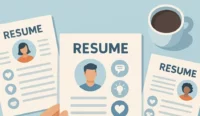Job interviews can feel like navigating a minefield—one wrong step can land you in the rejection pile. While you want to present yourself authentically, certain revelations can significantly harm your chances of landing that dream position. Based on insights from experienced recruiters who have interviewed thousands of candidates, this comprehensive guide covers what information you should keep to yourself during the interview process.
1. Too Many Personal Details
Why Oversharing Hurts Your Chances
Revealing too many personal facts about yourself can be detrimental to your interview success. This often happens when candidates are either nervous or naturally long-winded. Neither trait impresses hiring teams looking for professionals who can communicate effectively.
The Business Impact of Being Long-Winded
Employers directly link your ability to articulate yourself in an interview to how you would perform in business settings. If you ramble during an interview, they’ll assume you’ll do the same in client meetings or team presentations. This is particularly problematic for roles requiring clear, concise communication like sales or management positions.
How to Strike the Right Balance
- Keep your interview answers between 2-3 minutes
- Focus on job-relevant information
- Practice your responses to reduce nervousness
- Avoid sharing personal hobbies or interests unless directly relevant
2. The Real Reason You’re Leaving Your Current Job
The Danger of Complete Honesty
While honesty is important, sharing the complete, unfiltered truth about why you’re leaving your current employer can backfire. Negative comments about previous employers raise immediate red flags.
What Interviewers Actually Hear
When you say: “My boss was terrible, we constantly butted heads”
They hear: “This candidate is difficult to work with and could become a problem for us too”
When you say: “I was bored and unchallenged”
They hear: “This person lacks initiative to find ways to enrich their role”
How to Frame Your Departure Positively
- Focus on what you’re moving toward rather than what you’re leaving behind
- Emphasize growth opportunities you’re seeking
- Frame challenges as learning experiences
- Avoid criticism of former employers or colleagues
3. Career Plans That Don’t Align With the Position
The Five-Year Plan Pitfall
When interviewers ask about your future plans, they’re assessing your commitment to the role and career path. Revealing plans that don’t align with the position can immediately disqualify you.
Red Flag Responses
- “I plan to start my own business in a different field”
- “I’m using this as a stepping stone to switch careers entirely”
- “I only need this job until my side hustle takes off”
How to Discuss Career Aspirations Appropriately
- Show passion for the industry and role you’re applying for
- Discuss growth within the company or field
- Connect your long-term goals to the position’s trajectory
- Demonstrate commitment to developing relevant skills
4. Your Financial Desperation
Why Urgency Repels Employers
Similar to dating, desperation in job hunting can push opportunities further away. Employers want candidates who are choosing their company for the right reasons—not just because they urgently need a paycheck.
Signs of Desperation to Avoid
- Mentioning financial hardships
- Expressing urgency to start immediately due to personal circumstances
- Appearing too eager to accept any terms offered
- Following up excessively soon after interviews
Projecting Confidence Despite Circumstances
- Focus on the value you bring to the role
- Maintain a calm, collected demeanor
- Express genuine interest in the company and position
- Frame your availability as flexibility rather than desperation
5. Your Age or Retirement Timeline
Age Discrimination Works Both Ways
Whether you’re perceived as too young or too old, age-related information can trigger unconscious bias. Age discrimination, while illegal, remains a reality in hiring practices.
Inadvertent Age Indicators
- Outdated email addresses or technology references
- Including graduation dates from decades ago
- Mentioning retirement plans or “last job” aspirations
- Using outdated terminology or references
How to Present as Timeless
- Focus on recent, relevant experience
- Highlight your adaptability and continuous learning
- Demonstrate current industry knowledge
- Avoid phrases like “in my day” or references to decades of experience
6. Medical Issues or Disabilities
Legal Protections and Strategic Disclosure
While laws protect candidates from discrimination based on medical conditions or disabilities, strategic disclosure remains important. The general rule: only reveal information that directly affects your ability to perform the essential functions of the job.
When to Disclose
- After receiving a job offer, if accommodations are needed
- During the application process if specifically asked about ability to perform job functions
- Never during initial interviews unless directly relevant to job requirements
What to Keep Private
- Pregnancy
- Non-job-impacting disabilities
- Medical history
- Mental health conditions that don’t affect job performance
Looking for Interview-Ready Candidates?
Post jobs for free with WhatJobs and find candidates who know how to present themselves professionally in interviews. Our platform connects you with qualified talent who understand workplace communication and professional boundaries.
7. Previous Salary Information
How Salary Disclosure Limits Your Earning Potential
Revealing your previous salary can lock you into compensation based on past earnings rather than current market value. This particularly disadvantages those who were previously underpaid.
Better Approaches to Salary Discussions
- Research industry standards for the position
- Focus on the value you bring to the role
- Provide a desired salary range based on market research
- Deflect direct questions about previous compensation
Salary Negotiation Strategies
- Wait for the employer to make the first offer
- Consider total compensation, not just base salary
- Be prepared to justify your worth with specific achievements
- Know your minimum acceptable offer before negotiations begin
Bonus: Political Beliefs
The High-Risk, No-Reward Topic
Political discussions in professional settings rarely end well. Even if you believe your views align with the company culture, expressing strong political opinions during an interview creates unnecessary risk.
Why Politics Should Stay Out of Interviews
- You can’t accurately gauge the personal beliefs of interviewers
- Political comments can be interpreted as judgmental or divisive
- Workplace harmony requires professional boundaries
- Your qualifications, not your politics, should determine hiring decisions
FAQ About Job Interview Disclosures
What should I say when asked why I left my previous job after being fired?
Focus on the lessons learned and growth since that experience. Frame it as a mismatch or learning opportunity rather than placing blame. For example: “That role helped me realize I perform best in environments with [specific characteristic]. Since then, I’ve developed [relevant skill] and successfully applied it in [recent achievement].” When discussing job interview disclosures, always emphasize what you’ve learned rather than dwelling on negative experiences.
How do I avoid revealing my age during an interview?
Focus on your most recent and relevant experience rather than your entire work history. Remove graduation dates from your resume, and highlight current skills and industry knowledge. During the interview, emphasize your adaptability, continuous learning, and familiarity with current trends and technologies. Job interview disclosures about age can be avoided by focusing on your qualifications and value rather than your timeline.
What’s the best response when asked about salary expectations in a job interview?
Rather than revealing your current or previous salary, respond with a researched salary range based on the position, your experience level, and the local market. For example: “Based on my research for similar roles in this area and the value I bring with my specific experience in [relevant achievement], I’m looking for a range between $X and $Y.” Careful job interview disclosures about compensation help ensure you’re valued appropriately.
How should I handle questions about gaps in my employment history during job interviews?
Be honest but strategic. Focus on productive activities during that time: skill development, freelance work, education, or personal projects that enhanced your professional capabilities. Emphasize your continued engagement with your industry and readiness to contribute immediately. When making job interview disclosures about employment gaps, highlight how you’ve maintained or improved your professional value during that time.
By avoiding these seven critical disclosure mistakes, you’ll position yourself as a professional candidate who understands workplace dynamics and communication boundaries. Remember, an interview is not just about showcasing your skills—it’s about demonstrating your professional judgment and fit for the organization.

![What Not to Reveal in a Job Interview 7 Things That Could Cost You the Offer [2025 Guide]](https://www.whatjobs.com/career-advice/wp-content/uploads/2025/07/What-Not-to-Reveal-in-a-Job-Interview-7-Things-That-Could-Cost-You-the-Offer-2025-Guide.webp)




